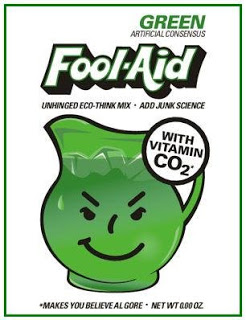 By Patrick J. Michaels, Planet Gore
By Patrick J. Michaels, Planet Gore
What on Earth is going on in Washington? The public believes less and less that human beings are responsible for global warming, surface temperature shows no net change in over a decade, and there’s still a bill about to be debated in the House that will require the average American in 2050 to have a “carbon footprint” no larger than it was for the average American in 1867. The politics of global warming are becoming increasingly disconnected from the people. Day after day, hour after hour, telescreens shout, “Go Green! Go Green!” Fewer and fewer people care. On April 19, Rasmussen Reports released a new global warming poll: 48 percent of respondents believe that observed climate changes are being “caused by planetary trends,” while 34 percent believe they are a result of human influence on the atmosphere. When Obama was sworn in, the relative numbers were 44 percent and 41 percent. Just three months ago, opinion was pretty much evenly split, and now there’s a whopping 14 percent plurality in favor of “natural causes.” This is a change from bad to worse in the eyes of environmentalists. In January, Gallup found that, out of 20 prominent issues, Americans ranked global warming dead last in terms of importance. If the newer Rasmussen results are any guide, support has waned even further since then. If the political class would have done its homework, it would have seen this coming. The incessant hype has generated a massive political backlash. It was first documented over a year ago in the refereed journal Risk Analysis, by Paul Kellstedt and two colleagues, political scientists at Texas A&M University. The standard thinking is called the “knowledge deficit” model. That’s academese for the notion that the poor blokes aren’t concerned about global warming because they’re just stupid and haven’t heard enough about it. Obviously no one watches television any more (CNBC’s peacock is green this week), walks outside in major urban downtowns (plastered with billboards and posters — from energy companies — urging their customers to use less of their products), or goes to the movies (The Day After Tomorrow, An Inconvenient Truth, Ice Age: The Meltdown, etc). Actually, people still do go to the movies, and watch TV, and are assaulted every urban minute with global-warming propaganda. And, according to Kellstedt, the more people know about global warming, the less they care:
Contrary to the assumptions underlying the knowledge-deficit model, as well as the marketing of movies like Ice Age or An Inconvenient Truth, the effects of information on both concern for global warming and responsibility for it are exactly the opposite of what were expected.
Jon Gertner touched on this in last Sunday’s New York Times Magazine. He noted that debate as to why climate change isn’t higher up on the priority totem-pole usually is blamed on “the doubt-sowing remarks of climate-change skeptics,” or “the poor communication skills of good scientists.” This prism has bent the light on global warming exactly wrong. In fact, it is the communication skills of scientists that are responsible for people’s opinions. Kellstedt found that people “with high confidence in scientists . . . show less concern for global warming,” as did the “more informed respondents.” Americans’ lack of alarm has less to do with “skeptics” than it does with people’s perception of mainstream science. Interestingly, this is parallel to other issues at the science-political nexus. Despite years of campaigning against genetically modified (GM) food on the part of many environmentalists, the more people learn, the less concerned they are about that, too. Maybe this has to do with the fact that Americans have been consuming, in one form or another, GM food for decades, and we obviously aren’t dead yet. Sober scientists note that GM foods are nutritionally indistinguishable from their progenitors — so when someone else loudly and angrily foretells disaster upon disaster that will befall us from the use of GM products, people say “so what?” And when they see some movie about the horrors of global warming — if they know that scientists observe that the planet’s surface has been warming episodically and modestly for a century — they likewise say, “So what? It’s a movie.” Washington would be well-advised to pay attention to what folks are telling pollsters out beyond the Beltway. But it’s Earth Day, so I expect the response of the political class here will likewise be, “So what?” — Patrick J. Michaels is senior fellow in environmental studies at the Cato Institute and author of the forthcoming Climate of Extremes: Global Warming Science They Don’t Want You to Know. Source
"green" propaganda is everywhere and there's no escape from it, but it's a hard sell to convince people of the actual (fraudulent) science of CO2 reflecting sunrays and heating the earth and therefore somehow causing harm etc. etc. So what they USUALLY rely on is people who are STUPID or IGNORANT so they believe "hot exhaust air" is causing "warming", or they show smokestacks with white water wapor emerging from it, but they show it at sundown so it appears black and "dirty". Their science is so poor, even a causual observer will see right through the scam, so they need to hammer everybody 24/7 with fake optimism about their new "green economy" that is a cover for deindustrialization and offshoring of middle class jobs.